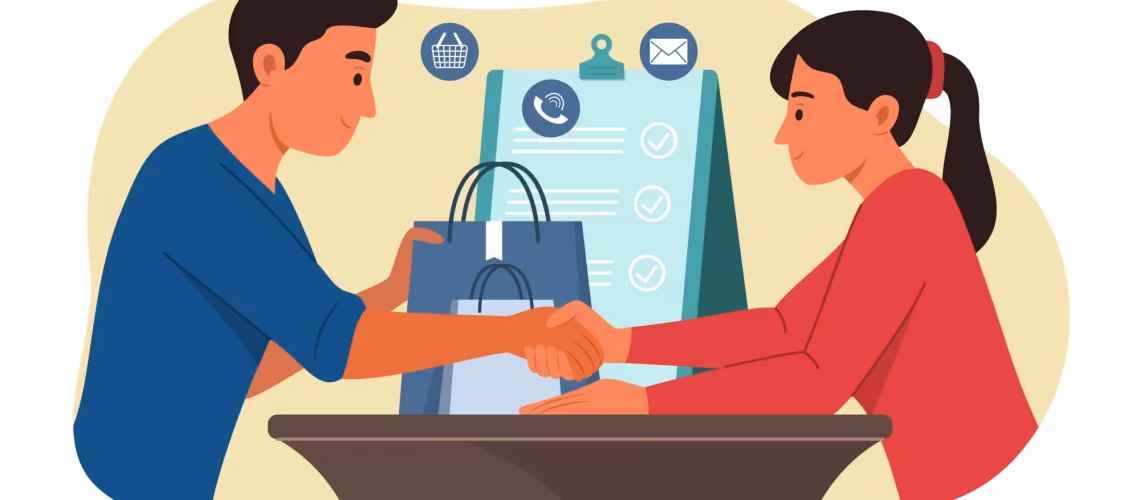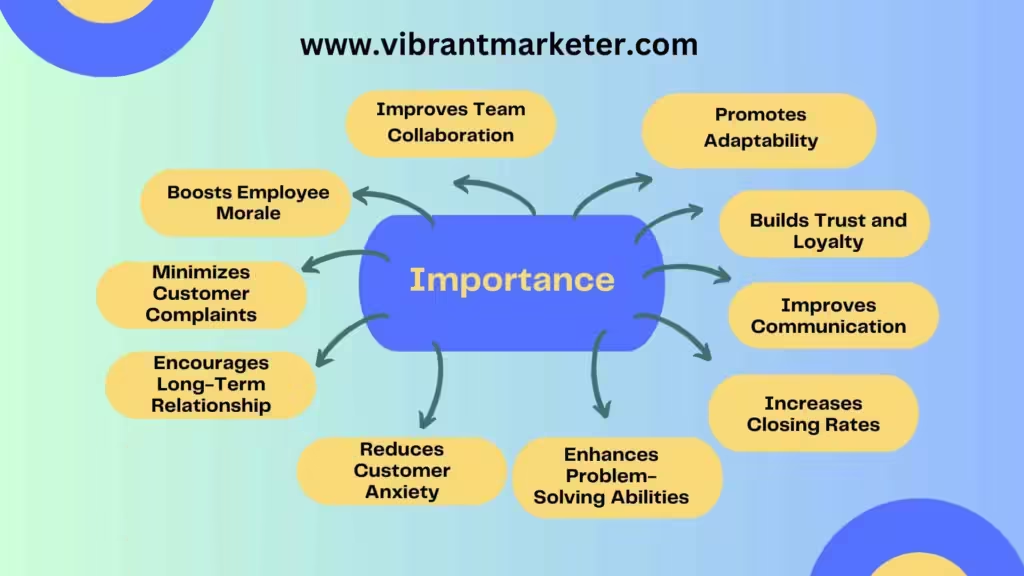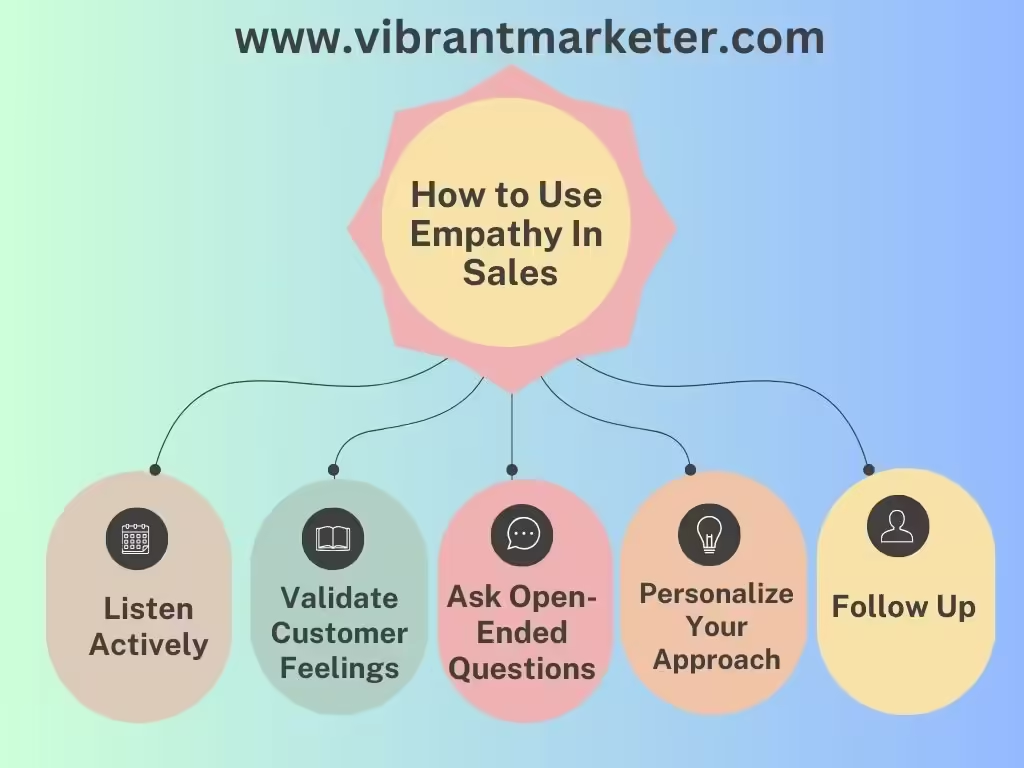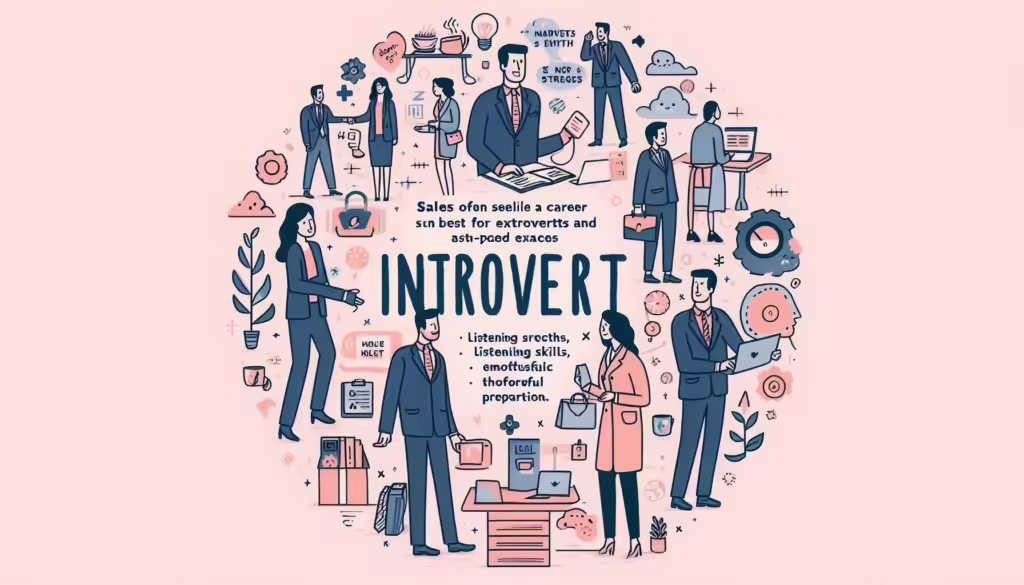Table Of Contents

The Importance of Empathy in Sales
Brief Idea About Empathy in Sales

Empathy in sales is more than just a soft skill—it’s a powerful tool for building trust, understanding customer needs, and creating long-term relationships. When sales professionals practice empathy, they can genuinely understand and respond to a customer’s emotions, challenges, and goals, which leads to better communication, stronger connections, and more successful sales outcomes. In this article, we’ll break down what empathy in sales really means, why it’s essential, and how to apply it in everyday sales situations.
What is Empathy in Sales?
Empathy is the ability to put yourself in another person’s shoes and understand how they feel. In sales, this means seeing things from the customer’s perspective, recognizing their concerns, and connecting with them on a personal level. Empathy in sales isn’t about agreeing with everything the customer says—it’s about making them feel understood and valued.
- Example: Imagine a customer who is frustrated because they’ve had a bad experience with a similar product from another company. An empathetic salesperson might say, “I understand how disappointing it can be to feel let down by a product. Let’s discuss what’s most important to you so we can find a solution that won’t let you down.” This approach acknowledges their emotions and reassures them that you’re focused on helping them.
Why is Empathy Important in Sales?

Empathy is crucial in sales because it helps build trust, enhances communication, and leads to better sales results. Here’s why it matters:
1. Builds Trust and Loyalty
Trust is the foundation of any strong relationship, and sales are no different. When customers feel that you genuinely care about their needs and aren’t just trying to make a sale, they’re more likely to trust you and remain loyal over time.
- Data Point: According to a study by Harvard Business Review, companies with highly empathetic sales teams had 20% higher customer loyalty scores than those without an emphasis on empathy.
- Expert Insight: Angela Ahrendts, former SVP of Retail at Apple, once said, “Empathy is one of the biggest creators of trust in a sales relationship.” Her belief was that by understanding customer needs, Apple’s salespeople could create a more positive and trustworthy experience, which led to high customer loyalty.
2. Improves Communication
Empathy enables salespeople to understand what customers really want, which makes it easier to communicate effectively. When you know a customer’s concerns or desires, you can tailor your message to address those points directly, leading to clearer, more persuasive conversations.
- Example: If a customer expresses concerns about price, an empathetic salesperson wouldn’t simply push them to buy. Let’s go over the benefits in detail so you can see the full value of what you’re getting.”
- Case Study: Zendesk, a customer service software company, uses empathy training for their sales team to enhance customer interactions. By actively listening and validating customer concerns, they found that customer satisfaction improved by over 25%.
3. Increases Closing Rates
Empathy helps salespeople build rapport, address objections thoughtfully, and make customers feel comfortable moving forward with a purchase.
- Data Point: Gallup research shows that customers who feel emotionally connected to a brand are 52% more likely to engage in future purchases.
- Example: An empathetic approach might involve a salesperson listening to a customer’s specific challenges, like time constraints, and then proposing a tailored solution that respects those needs. This makes the customer feel valued and increases the likelihood of closing the sale.
4. Enhances Problem-Solving Abilities
Empathy allows sales professionals to better understand the customer’s challenges and needs, which helps them offer tailored solutions. Instead of assuming what the customer needs, an empathetic salesperson listens carefully to the customer’s pain points and recommends products or services that directly address those issues.
- Example: Suppose a customer is worried about the installation process for a software product. An empathetic salesperson might say, “I understand that setup can be stressful. We have an onboarding team that will guide you through each step to make sure it goes smoothly.”
- Expert Insight: Daniel Pink, author of “To Sell is Human,” emphasizes that problem-solving in sales is much more effective when empathy is involved. “Empathy helps sellers see beyond the sale to the true need they’re addressing,” he says.
- Tip: Ask customers to explain their challenges in detail, and then suggest solutions that specifically address those concerns. Listening to their full problem first helps you provide a more targeted solution.
5. Reduces Customer Anxiety
Customers may feel anxious or uncertain about a purchase, especially if it’s a big investment. An empathetic approach can help ease these fears. When customers feel that their concerns are understood, they’re more likely to feel comfortable moving forward.
- Example: If a customer hesitates due to the price, an empathetic response could be, “I completely understand that price is an important factor. Let’s discuss how this product’s value can help you in the long run.”
- Case Study: At Warby Parker, an eyewear company, sales reps are trained to acknowledge and empathize with customers’ anxieties about choosing glasses online. By offering free home try-ons, they’ve reduced customer anxiety and increased conversion rates.
- Tip: To reduce anxiety, acknowledge the customer’s concern first, and then explain how your product or service can alleviate their worries.
6. Encourages Long-Term Relationships
Empathy creates stronger relationships because customers feel valued and appreciated. When customers sense that a salesperson genuinely cares about their well-being, they’re more likely to come back for future purchases and even refer others.
- Example: After a customer buys a product, follow up with a call or email, asking if they have any feedback or questions.
- Data Point: According to Bain & Company, a 5% increase in customer retention can lead to a 25% to 95% increase in profits, showing the financial value of building long-term relationships through empathy.
- Expert Insight: Brian Chesky, CEO of Airbnb, stresses that “building trust with guests and hosts is at the heart of our business.” By focusing on empathy, Airbnb has built a community that continues to thrive.
- Tip: Focus on long-term connection over immediate sales by showing genuine interest in helping customers with their current and future needs.
7. Minimizes Customer Complaints
When customers feel understood and appreciated, they’re less likely to file complaints, even if things don’t go perfectly. Empathy helps salespeople resolve potential issues before they escalate into complaints.
- Example: If a customer is unhappy with a delayed delivery, an empathetic salesperson might respond, “I understand that waiting can be frustrating. We’re working hard to resolve this, and I’ll keep you updated every step of the way.”
- Case Study: Amazon has invested in empathy training for customer service, which has led to higher customer satisfaction scores and fewer complaints. By understanding and addressing customer concerns proactively, they can often solve issues before they become major problems.
- Tip: When dealing with dissatisfied customers, listen to their concerns without interruption and acknowledge their feelings before offering solutions. This can reduce frustration and complaints.
8. Boosts Employee Morale
When empathy is valued in a sales team, employees feel more motivated and connected to their work. Sales roles can be challenging, and empathy not only helps with customer interactions but also creates a supportive work environment.
- Example: A sales manager who shows empathy by recognizing team members’ struggles or challenges can increase overall morale and job satisfaction.
- Expert Insight: Satya Nadella, CEO of Microsoft, says, “Empathy makes you a better innovator. If you can connect with people, you can come up with new ideas.” Under Nadella’s leadership, Microsoft has placed a strong emphasis on empathy, leading to higher employee satisfaction and better overall performance.
- Tip: Sales managers can encourage empathy by recognizing individual achievements, being approachable, and offering support to employees. When salespeople feel valued, they’re more motivated to succeed.
9. Improves Team Collaboration
Empathy fosters collaboration among team members, as they’re more likely to share insights and strategies when they feel understood and respected. A culture of empathy helps sales teams work together more effectively, leading to improved performance.
- Example: During team meetings, encourage open discussions about challenges each team member is facing. This helps foster a sense of shared purpose and problem-solving.
- Data Point: A study by Google’s Project Aristotle found that psychological safety, which empathy fosters, was the most important factor for high-performing teams. Teams that felt safe and valued were more productive and collaborative.
- Tip: Encourage team members to listen to and support each other, which builds empathy within the team. This not only boosts morale but also helps everyone perform better by working together.
10. Promotes Adaptability
Empathy helps sales professionals adapt their approach to suit each customer’s unique needs. When you understand where a customer is coming from, it’s easier to be flexible and offer solutions that are truly beneficial for them.
- Example: If a customer mentions that they’re on a tight timeline, an empathetic salesperson might say, “I can see that timing is crucial for you. Let me see how we can expedite the process to meet your deadline.”
- Case Study: HubSpot, a leading CRM platform, trains its sales team to tailor their approach based on individual customer needs. By focusing on empathy, HubSpot’s salespeople adapt their strategies to deliver highly personalized customer experiences, which has resulted in increased customer satisfaction and retention.
- Tip: Be open to adjusting your pitch, tone, or offer based on customer feedback. Flexibility shows that you’re committed to meeting their specific needs, which enhances the customer’s overall experience.
How to Use Empathy in Sales: Key Steps

1. Listen Actively
Active listening is the foundation of empathy. It means focusing completely on the customer’s words without planning your next response. Active listening involves eye contact, nodding, and sometimes repeating what the customer has said to show you understand.
- Example: If a customer shares a specific concern, you could respond with, “I hear that reliability is really important to you. Can you tell me more about what’s most critical in terms of reliability?”
- Expert Insight: Simon Sinek, motivational speaker and author, emphasizes, “Listening is not understanding the words of the question asked; listening is understanding why the question was asked in the first place.” In sales, active listening reveals underlying needs and builds a bridge of trust.
- Tip: During a call, try not to interrupt or jump to conclusions. Let the customer finish their thought, and wait a few seconds before responding. This shows them that you’re fully engaged in the conversation.
2. Acknowledge and Validate Customer Feelings
Validation shows customers that their feelings are important and understood. Acknowledging their concerns or desires makes them feel respected, which builds trust and connection.
- Example: If a customer says they’re hesitant to commit due to a tight budget, an empathetic response could be, “I understand that making a financial commitment is a big decision. Let’s explore options that might be a good fit within your budget.”
- Case Study: American Express teaches their sales representatives to validate customers’ emotions first before offering solutions. By acknowledging feelings, they’ve seen an increase in customer satisfaction rates, as customers feel valued and heard.
3. Ask Open-Ended Questions
Open-ended questions encourage customers to share more about their needs, preferences, and challenges. They help you understand the customer’s perspective, making it easier to tailor your approach.
- Example: Instead of asking, “Are you interested in this product?” try asking, “What’s most important to you when choosing a product like this?” This opens up a dialogue and gives the customer a chance to share what they truly need.
- Data Point: Research by Salesforce shows that sales reps who ask open-ended questions have a 40% higher success rate than those who rely on yes-or-no questions.
- Tip: Use questions like, “Can you please tell me more about…?” or “What are your main goals with this solution?” These prompt the customer to open up and share details that can help you better meet their needs.
4. Personalize Your Approach
Personalization is a natural extension of empathy. When you understand a customer’s unique situation, you can tailor your product pitch or service to fit their exact needs. This shows the customer that you’re not just making a generic pitch—you’re offering a solution that’s relevant to them.
- Example: A customer mentions they’re looking for an eco-friendly product. An empathetic salesperson might respond by highlighting the environmentally sustainable features of their product, making it clear that they’re attentive to the customer’s values.
- Expert Insight: Howard Schultz, former CEO of Starbucks, credits the company’s success to empathetic customer service. “We’re in the people business serving coffee, not the coffee business serving people,” he once said, emphasizing that understanding people’s unique needs is essential for lasting customer relationships.
5. Follow Up with Genuine Care
Empathy doesn’t end with the sale. Keep In touch or Following up with your customers shows that you really cares about their experience even after the transaction is complete. This builds long-term relationships and makes customers feel valued.
- Example: After a purchase, send a personalized message asking if the customer has any questions or feedback. If they had concerns during the sale, address them again in the follow-up to show you haven’t forgotten their needs.
- Case Study: Amazon often follows up with customers to ensure satisfaction. Their focus on empathy and proactive customer service has led to high customer retention and satisfaction.
- Tip: Use follow-up emails or calls not just to offer additional products, but to ask for honest feedback and ensure that they’re satisfied. This makes customers feel respected and appreciated.
Conclusion: The Importance of Empathy in Sales
Empathy is more than just being nice; it’s about deeply understanding the customer’s journey, recognizing their needs, and showing genuine care in every interaction. From active listening to personalized follow-ups, empathy enables sales professionals to build trust, improve communication, and increase closing rates, creating a positive experience that customers remember. When practiced consistently, empathy not only enhances sales success but also builds strong, lasting relationships with customers.
FAQs
How does empathy improve customer trust?
When a salesperson shows genuine care and understanding, customers feel valued and are more likely to trust the salesperson and their recommendations.
Can empathy actually help close more sales?
Yes, empathy can increase sales because customers are more likely to buy from someone who understands their needs and provides relevant solutions.
How can empathy reduce customer complaints?
Empathetic salespeople proactively address customer issues, making customers feel heard and understood, which can prevent complaints before they happen.
How does empathy help with customer retention?
By building stronger, more personalized relationships, empathy increases the chances of customers returning and recommending the salesperson or business.
Is empathy a skill that can be developed in sales?
Absolutely! Salespeople can practice empathy by actively listening, asking open-ended questions, and focusing on the customer’s feelings and concerns.
What are some practical ways to show empathy in sales?
Listen actively, validate the customer’s feelings, personalize solutions to their specific needs, and follow up to ensure their satisfaction.
Can empathy improve teamwork within a sales team?
Yes, empathy fosters collaboration and support among team members, creating a more positive and productive work environment.
What impact does empathy have on problem-solving in sales?
Empathy allows salespeople to understand the true needs and challenges of customers, leading to more effective and customized problem-solving solutions.
Share this post
Related Posts






